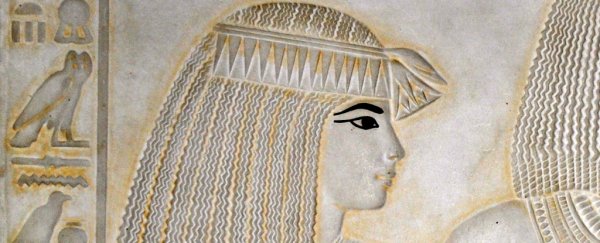Merit Ptah. In recent decades, the name of this ancient Egyptian doctor, said to have lived nearly 5,000 years ago, has become a figurehead of women in science, technology, maths, and engineering (STEM).
She is credited as being the "first woman known by name in the history of science". But there's a bit of a problem - Merit Ptah probably didn't exist. Not as described, at any rate.
New historical research has traced the legend of Merit Ptah to its origins, and discovered that a lot of the details got mixed up in the 80 years since her name first surfaced in 1938.
In fact, according to medical historian Jakub Kwiecinski of the University of Colorado Anschutz, the entire legend of this ancient Egyptian doctor is almost completely wrong.
"Merit Ptah was everywhere. In online posts about women in STEM, in computer games, in popular history books, there's even a crater on Venus named after her," Kwiecinski said.
"And yet, with all these mentions, there was no proof that she really existed. It soon became clear that there had been no ancient Egyptian woman physician called Merit Ptah."
The legend of Merit Ptah - a name meaning "beloved of the god Ptah" - started with early 20th century Canadian feminist and doctor Kate Campbell Hurd-Mead.
In 1938, she published a book titled A History of Women in Medicine: From the Earliest of Times to the Beginning of the Nineteenth Century. In this book, on page 16, Campbell Hurd-Mead described an ancient Egyptian female physician.
"The first woman doctor of 'the old kingdom' in the fifth dynasty, or about 2730 BC, practiced during the reign of a queen Neferirika-ra. Her son was a high priest at whose tomb is a tablet describing his mother as the 'Chief Physician'," Campbell Hurd-Mead wrote.
And, "in a tomb in the Valley of the Kings is the picture of a woman named Merit Ptah, the mother of a high priest, who is calling her 'the Chief Physician,' although neither her costume nor her bearing indicate her medical profession or her importance."
In addition to the fact that the Valley of the Kings wasn't in use until over 1,000 years later - from 1539 BCE to 1075 BCE - there are currently no records of any physician named Merit Ptah in the Old Kingdom of ancient Egypt, female or otherwise, Kwiecinski found.
"Merit Ptah as a name existed in the Old Kingdom, but does not appear in any of the collated lists of ancient Egyptian healers - not even as one of the 'legendary' or 'controversial' cases," he said.
"She is also absent from the list of Old Kingdom women administrators. No Old Kingdom tombs are present in the Valley of the Kings, where the story places Merit Ptah's son, and only a handful of such tombs exist in the larger area, the Theban Necropolis."
That does not mean there were no female doctors recorded in ancient Egypt, however. In fact, that's where it seems the mix-up occurred.
Because there was an Old Kingdom female doctor who seems to pretty closely match the details of Campbell Hurd-Mead's Merit Ptah. In fact, it's almost exactly the same in everything but the name.
Her name was Peseshet, and we know about her because she is described in the tomb of Akhethotep - her son, a royal official and overseer of priests, who lived during the Fifth Dynasty around 2400 BCE, and was buried in an elaborate tomb in the necropolis of Saqqara.
A false door described both Akhethotep's mother and father. His father was a royal official named Ptahhotep, meaning "Peace of the god Ptah". His mother was Peseshet, and she was named as "Overseer of Woman Physicians."
A book briefly mentioning Peseshet (but leaving her nameless) was found in Campbell Hurd-Mead's personal library. Kwiecinski suggests that Campbell Hurd-Mead confused Peseshet with the wife of the vizier Ramose, who lived around 1350, and was buried in the Valley of the Kings. Her name was Merit Ptah.
"Unfortunately, Hurd-Mead in her own book accidentally mixed up the name of the ancient healer, as well as the date when she lived, and the location of the tomb," Kwiecinski said.
"And so, from a misunderstood case of an authentic Egyptian woman healer, Peseshet, a seemingly earlier Merit Ptah, 'the first woman physician', was born."
But this confusion shouldn't detract from the fact that women were working as physicians in ancient Egypt thousands of years ago, nor the importance of what Merit Ptah represents.
"While Merit Ptah is not an authentic ancient Egyptian character and not a good symbolic founding figure, she is a real symbol of the collective effort to write women back into history," Kwiecinski wrote in his paper.
"She is a genuine hero of the modern feminist struggle."
The research has been published in the Journal of the History of Medicine and Allied Sciences.
